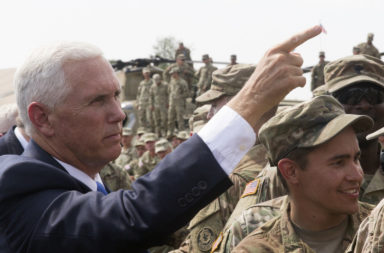Is the longstanding relationship between America and Europe suddenly over?
- Chancellor Angela Merkel calls for Europe to rely on itself only in wake of US withdrawal from Paris climate accord.
- “The times when we could completely rely on others are, to an extent, over.”
- What does the widening gulf between Europe, the UK and America mean for terrorism, trade and global stability?
- Are Americans and Europeans really natural allies?
Just a few years ago it would seem unthinkable; that the historic and long-depended-upon relationship between the US and Europe would turn this cold, this quickly.
Yet Chancellor Angela Merkel appeared to predict exactly that with her comments following America’s withdrawal from the Paris climate change agreement that has seen relations fall to a new low.
“The times in which we could completely depend on others are, to a certain extent, over,” the German leader declared during a speech in Munich on Sunday. “I’ve experienced that in the last few days — we Europeans truly have to take our fate into our own hands.”
Make America Great Again… Without Europe
Continuing the war of words that had already heightened tensions between the world’s largest two economic blocs, President Donald Trump had earlier called Germany’s trade and spending policies “very bad” – intensifying a row between the longtime allies and drawing outrage as the “destroyer of Western values” according to German politician Martin Schulz.
While Foreign Minister Sigmar Gabriel suggested the spat was merely a rough patch and sought to allay the natural fears of those who fear the very real effects of a distancing between Europe and the US, both Trump and Merkel’s recent comments point to that very situation occurring.
A History of Transatlantic Friendship in Numbers and Trade
To many, the longstanding economic and political alliance between the Eurozone and the USA is natural. Both share fundamental values of freedom, democracy, respect for the rule of law, and human rights concerns and aims.
As the two largest economies in the world, the U.S. and EU account for over 50 % of the global GDP as well as a third of global trade, acting as the central drivers of the global economy.
U.S. Secretary of Commerce Gary Locke noted in October 2010 that Transatlantic Foreign Direct Investment has created 14 million jobs on both sides of the Atlantic, meaning that more than pride is at stake should the relationship deteriorate further.
Implications for Terrorism and Security
Similarly, the U.S. and EU both face major global challenges on issues ranging from counter-terrorism to stability in the Middle East, Iran, Afghanistan and Pakistan, the Balkans, and fighting international crime.
These common threats and dangers to their security and well-being had previously encouraged co-operation and led to renewed efforts and unification of policies, particularly after the 9/11 attacks in New York. The potential disintegration of the relationship has huge implications for security on both sides of the Atlantic.
Here are some of the joint initiatives that could be “off the table” should a chill in relations occur.
- Extradition and mutual legal assistance
- “Transport security and co-operation to remove any obstacles hindering the procedures between Europe and the US.
- Secure travel documents containing biometric identifiers.
- Information abd intelligence sharing.
- The freezing of suspected terrorists’ bank accounts.
- Judicial co-operation to better prosecute terrorists and international criminals.
Was the Relationship Really So Strong to Begin With?
While conventional wisdom has it that Trump’s actions have caused a severe deterioration in relations, others are more skeptical over how strong the bond between Europe and the US is in reality.
American historian and commentator Robert Kagan is one of those critics, stating that “Americans are from Mars and Europeans are from Venus”
Describing the partnership as “America “making the dinner” and Europe “doing the dishes” he argues that the two are actually polar opposites in their identities and worldviews.
For Americans, he ascribes them as seeing the world “divided between good and evil”, “favoring policies of coercion rather than persuasion”, employing “punitive sanctions to induce better behavior” and describing them as “stubborn to work cooperatively”
In contrast, he claims that Europe’s “Approach to problems (contains) greater nuance and sophistication” and that they employ “influence through subtlety and indirection”. Furthermore, the EU mindset is “more tolerant of failure and more patient for a solution”, while they “take note of international structures” and make “use of economic ties to bind nations together” in contrast to the US style.
For Kagan and others, the breakdown in relations is more natural than others would have you believe.
Trump Making Waves in Foreign Policy
Whatever the truth of the matter is, it is clear that Donald Trump is keen to make his presence felt on the word stage.
Frustrated at home by the blocking actions of Congress, he now looks to achieve something tangible in his first term in his foreign policy and put his stamp on the presidency.
With domestic policy largely ineffective, we can expect much more from the isolationist, climate change-denying POTUS in his interactions with world leaders.





